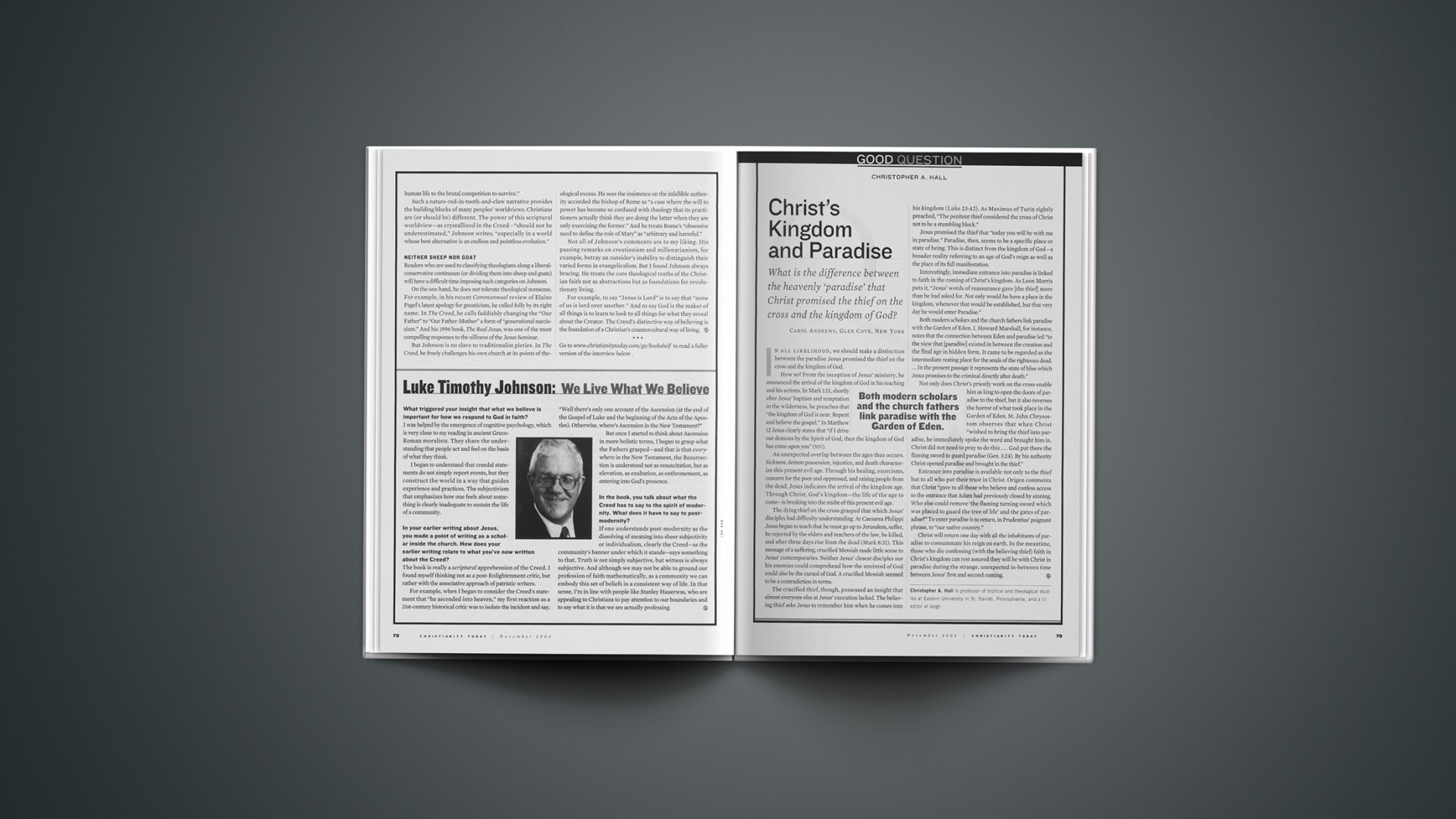IN ALL LIKELIHOOD, we should make a distinction between the paradise Jesus promised the thief on the cross and the kingdom of God.
How so? From the inception of Jesus’ ministry, he announced the arrival of the kingdom of God in his teaching and his actions. In Mark 1:15, shortly after Jesus’ baptism and temptation in the wilderness, he preaches that “the kingdom of God is near. Repent and believe the gospel.” In Matthew 12 Jesus clearly states that “if I drive out demons by the Spirit of God, then the kingdom of God has come upon you” (NIV).
An unexpected overlap between the ages thus occurs. Sickness, demon possession, injustice, and death characterize this present evil age. Through his healing, exorcisms, concern for the poor and oppressed, and raising people from the dead, Jesus indicates the arrival of the kingdom age. Through Christ, God’s kingdom—the life of the age to come—is breaking into the midst of this present evil age.
The dying thief on the cross grasped that which Jesus’ disciples had difficulty understanding. At Caesarea Philippi Jesus began to teach that he must go up to Jerusalem, suffer, be rejected by the elders and teachers of the law, be killed, and after three days rise from the dead (Mark 8:31). This message of a suffering, crucified Messiah made little sense to Jesus’ contemporaries. Neither Jesus’ closest disciples nor his enemies could comprehend how the anointed of God could also be the cursed of God. A crucified Messiah seemed to be a contradiction in terms.
The crucified thief, though, possessed an insight that almost everyone else at Jesus’ execution lacked. The believing thief asks Jesus to remember him when he comes into his kingdom (Luke 23:42). As Maximus of Turin rightly preached, “The penitent thief considered the cross of Christ not to be a stumbling block.”
Jesus promised the thief that “today you will be with me in paradise.” Paradise, then, seems to be a specific place or state of being. This is distinct from the kingdom of God—a broader reality referring to an age of God’s reign as well as the place of its full manifestation.
Interestingly, immediate entrance into paradise is linked to faith in the coming of Christ’s kingdom. As Leon Morris puts it, “Jesus’ words of reassurance gave [the thief] more than he had asked for. Not only would he have a place in the kingdom, whenever that would be established, but that very day he would enter Paradise.”
Both modern scholars and the church fathers link paradise with the Garden of Eden. I. Howard Marshall, for instance, notes that the connection between Eden and paradise led “to the view that [paradise] existed in between the creation and the final age in hidden form. It came to be regarded as the intermediate resting place for the souls of the righteous dead. … In the present passage it represents the state of bliss which Jesus promises to the criminal directly after death.”
Not only does Christ’s priestly work on the cross enable him as king to open the doors of paradise to the thief, but it also reverses the horror of what took place in the Garden of Eden. St. John Chrysostom observes that when Christ “wished to bring the thief into paradise, he immediately spoke the word and brought him in. Christ did not need to pray to do this … . God put there the flaming sword to guard paradise (Gen. 3:24). By his authority Christ opened paradise and brought in the thief.”
Entrance into paradise is available not only to the thief but to all who put their trust in Christ. Origen comments that Christ “gave to all those who believe and confess access to the entrance that Adam had previously closed by sinning. Who else could remove ‘the flaming turning sword which was placed to guard the tree of life’ and the gates of paradise?” To enter paradise is to return, in Prudentius’ poignant phrase, to “our native country.”
Christ will return one day with all the inhabitants of paradise to consummate his reign on earth. In the meantime, those who die confessing (with the believing thief) faith in Christ’s kingdom can rest assured they will be with Christ in paradise during the strange, unexpected in-between time between Jesus’ first and second coming.
Christopher A. Hall is professor of biblical and theological studies at Eastern University in St. Davids, Pennsylvania, and a CT editor at large.
Copyright © 2003 Christianity Today. Click for reprint information.
Related Elsewhere
Earlier Good Question columns include:
How is it that not all prayers for the salvation of others are answered?
If God is in us, shouldn’t it be easier to love one another?
Is there a biblical principle behind the punishment of those who break the law?
Won’t heaven’s joy be spoiled by our awareness of unsaved loved ones in hell?
Where exactly do “Oneness” Pentecostals stand in relation to orthodoxy?
Do a man and a woman become married after having sex or after exchanging vows?
Can We Expect God to Forgive Unbelievers Who ‘Don’t Know What They’re Doing’?










